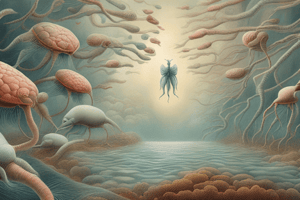Podcast
Questions and Answers
Which of the following drugs is commonly used for malaria chemoprophylaxis?
Which of the following drugs is commonly used for malaria chemoprophylaxis?
- Sulphadoxine-pyrimethamine
- Chloroquine
- Mefloquine (correct)
- Artemether-lumefantrine
Chloroquine is effective against all strains of malaria without any resistance issues.
Chloroquine is effective against all strains of malaria without any resistance issues.
False (B)
What is the mechanism of action of Artemisinin?
What is the mechanism of action of Artemisinin?
It produces free radicals that damage the parasite.
Primaquine targets the ________ stages of Plasmodium vivax.
Primaquine targets the ________ stages of Plasmodium vivax.
Match the following anti-malarial drugs with their respective categories:
Match the following anti-malarial drugs with their respective categories:
What is a serious side effect associated with primaquine in individuals with G6PD deficiency?
What is a serious side effect associated with primaquine in individuals with G6PD deficiency?
Combination therapies are preferred for treating malaria due to their increased resistance risk.
Combination therapies are preferred for treating malaria due to their increased resistance risk.
Name one main class of drugs used for treating active malaria infections.
Name one main class of drugs used for treating active malaria infections.
Flashcards are hidden until you start studying
Study Notes
Overview of Anti-Malaria Drugs
- Anti-malaria drugs are used to prevent and treat malaria, a disease caused by parasites transmitted through mosquito bites.
- Key drugs target different stages of the parasite life cycle and have varying mechanisms of action.
Categories of Anti-Malaria Drugs
-
Chemoprophylaxis
- Drugs used for prevention in individuals at high risk.
- Commonly used:
- Atovaquone-proguanil (Malarone)
- Doxycycline
- Mefloquine
-
Treatment Drugs
- Used for treating active malaria infections.
- Main classes include:
- Aminoquinolines
- Chloroquine
- Primaquine (also used for radical cure)
- Artemisinin-based Combination Therapies (ACTs)
- Artemether-lumefantrine (Coartem)
- Artesunate-amodiaquine
- Antifolates
- Sulphadoxine-pyrimethamine
- Aminoquinolines
-
Other Emerging Treatments
- Newer formulations and combinations are being researched to combat resistance:
- Tafenoquine (an 8-aminoquinoline)
- Synthetic drugs and vaccines under investigation.
- Newer formulations and combinations are being researched to combat resistance:
Mechanisms of Action
- Chloroquine: Inhibits parasite digestion of hemoglobin, leading to toxic build-up.
- Artemisinin: Produces free radicals that damage the parasite.
- Mefloquine: Disrupts the parasite's ability to detoxify heme.
- Primaquine: Targets liver stages of Plasmodium vivax and Plasmodium ovale.
Resistance Issues
- Resistance has emerged for several anti-malarial drugs, notably:
- Chloroquine: Widespread resistance in some regions.
- Sulphadoxine-pyrimethamine: Resistance reduces effectiveness.
- Continuous monitoring and adaptation of treatment guidelines are necessary.
Side Effects
- Common side effects include:
- Nausea and vomiting.
- Diarrhea.
- Headaches and dizziness.
- Serious side effects: Hemolytic anemia (with primaquine in G6PD deficiency).
Key Points for Management
- Drug selection should consider:
- Plasmodium species.
- Geography (resistance patterns).
- Patient's health status (e.g., G6PD deficiency).
- Treatment regimens should be completed as prescribed to reduce resistance development.
- Combination therapies are preferred for their efficacy and reduced resistance risk.
Conclusion
- Anti-malarial drugs are essential for managing malaria.
- Ongoing research is critical to address resistance and develop effective new treatments.
Anti-malaria Drugs
- Used to prevent and treat malaria, a parasitic disease spread through mosquito bites.
- Target different stages of the parasite life cycle.
Chemoprophylaxis
- Used for prevention in high-risk individuals.
- Common drugs:
- Atovaquone-proguanil (Malarone)
- Doxycycline
- Mefloquine
Treatment Drugs
- Used to treat active malaria infections.
- Main classes include:
- Aminoquinolines:
- Chloroquine
- Primaquine (also for radical cure)
- Artemisinin-based Combination Therapies (ACTs):
- Artemether-lumefantrine (Coartem)
- Artesunate-amodiaquine
- Antifolates:
- Sulphadoxine-pyrimethamine
- Aminoquinolines:
Other Emerging Treatments
- Newer formulations and combinations are under research:
- Tafenoquine (an 8-aminoquinoline)
- Synthetic drugs and vaccines
Mechanisms of Action
- Chloroquine: Inhibits parasite digestion of hemoglobin, leading to toxic buildup.
- Artemisinin: Produces free radicals that damage the parasite.
- Mefloquine: Disrupts the parasite's ability to detoxify heme.
- Primaquine: Targets liver stages of Plasmodium vivax and Plasmodium ovale.
Resistance Issues
- Resistance has emerged for several drugs:
- Chloroquine: Widespread resistance in some regions.
- Sulphadoxine-pyrimethamine: Resistance reduces effectiveness.
- Continuous monitoring and adaptation of treatment guidelines are crucial.
Side Effects
- Common side effects:
- Nausea and vomiting
- Diarrhea
- Headaches and dizziness
- Serious side effect: Hemolytic anemia (with primaquine in G6PD deficiency).
Key Points for Management
- Drug selection factors:
- Plasmodium species
- Geography (resistance patterns)
- Patient's health status (e.g., G6PD deficiency)
- Treatment regimens should be completed as prescribed to reduce resistance development.
- Combination therapies are preferred for efficacy and reduced resistance risk.
Conclusion
- Anti-malarial drugs are essential for malaria management.
- Ongoing research is vital to address resistance and develop effective new treatments.
Studying That Suits You
Use AI to generate personalized quizzes and flashcards to suit your learning preferences.




